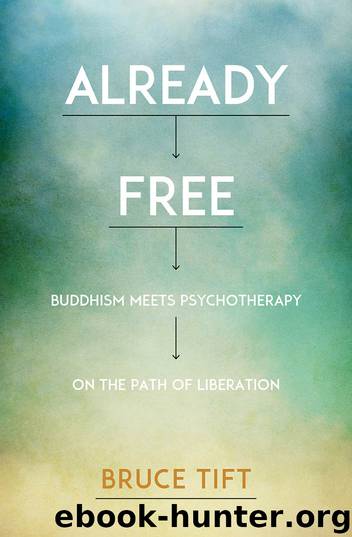Already Free by Bruce Tift

Author:Bruce Tift [Tift, Bruce]
Language: eng
Format: epub
ISBN: 9781622034567
Publisher: Sounds True
Published: 2015-06-02T00:00:00+00:00
THE THREE LEVELS OF STRUGGLE IN CLINICAL PRACTICE
Having described these three levels of struggle—content, process, and basic—perhaps it would be helpful to give some examples of how this may actually show up in my office. It’s very common at the beginning of therapeutic work for someone to be looking outside of themselves either for the cause of their problems or for their solution. Because we have very little control over others, even over our own feelings, this strategy guarantees struggle at the content level. This happens for everyone, but in my experience, it’s most vivid in relationship work.
When a couple first comes in, often each is blaming the other for their experience. “If only he would be more sensitive and emotionally available, I could be happy.” “If only she would stop telling me what to do, we would have peace.” Unconsciously—or, in some cases, quite consciously—the solution they have in mind is for their partner to change so that they don’t have to feel disturbed. This conclusion is often accompanied by a helpful list of what’s wrong with the other person. In most cases, each is hoping that I will validate their position about their partner and that their partner will “get the message” that they need to change.
What most couples don’t understand is that by placing the cause of their disturbance outside of themselves, they’re assuming a powerless child/victim position. This position itself is the main source of their distress. In the meantime, they’re missing an opportunity to learn how to deal with their own disturbance. They’re basically saying, “My life would be so much better if only you would be who I want you to be and not who you are.” That is, of course, a formula for chronic conflict—and for some very destructive experience in relationship. At this content level of struggle, the basic therapeutic intervention is to introduce the practice of personal responsibility. When working with a couple in conflict, I will continually interrupt, reframe, ask questions, tell jokes—all with the intention to make it increasingly difficult for the couple to maintain their drama of blame and struggle. When struggle with one’s partner is not so believable, we are forced to recognize our struggles with ourselves. Realizing that we are having feelings we don’t want to feel is already a first step in relating to these difficult feelings as possibly workable. By practicing personal responsibility, we can become curious about the fact that our disturbance seems to be something we’ve lived with our whole life. Perhaps we can remember feeling unloved as a child or like we had to be the junior parent. We start to realize that the issue we’ve been blaming our partner for causing is actually something we have within ourselves; it just happens that it’s being triggered very intensely in this relationship—which is what relationships do. But the other person is no longer seen as the cause and thus will never be the solution.
If all goes well, the client and/or couple begin
Download
This site does not store any files on its server. We only index and link to content provided by other sites. Please contact the content providers to delete copyright contents if any and email us, we'll remove relevant links or contents immediately.
The Way of Zen by Alan W. Watts(6608)
Ego Is the Enemy by Ryan Holiday(5428)
The Art of Happiness by The Dalai Lama(4126)
The Book of Joy by Dalai Lama(3981)
Why Buddhism is True by Robert Wright(3448)
Spark Joy by Marie Kondo(3301)
Shift into Freedom by Loch Kelly(3194)
Happiness by Matthieu Ricard(3041)
A Monk's Guide to a Clean House and Mind by Shoukei Matsumoto(2913)
The Lost Art of Good Conversation by Sakyong Mipham(2653)
The Meaning of the Library by unknow(2568)
The Unfettered Mind: Writings from a Zen Master to a Master Swordsman by Takuan Soho(2310)
The Third Eye by T. Lobsang Rampa(2263)
Anthology by T J(2210)
Red Shambhala by Andrei Znamenski(2198)
The Diamond Cutter by Geshe Michael Roach(2059)
Thoughts Without A Thinker: Psychotherapy from a Buddhist Perspective by Epstein Mark(2014)
Twilight of Idols and Anti-Christ by Friedrich Nietzsche(1893)
Advice Not Given by Mark Epstein(1880)
